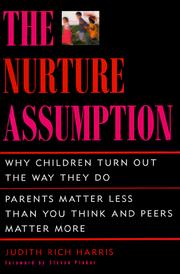Check nearby libraries
Buy this book

How much credit do parents deserve when their children turn out well? How much blame when they turn out badly? This book explodes some of our deepest beliefs about children and parents and gives us something radically new to put in their place. With eloquence and wit, Judith Harris explains why parents have little power to determine the sort of people their children become. It is what children experience outside the home, in the company of their peers, that matters most.
Parents don't socialize children: children socialize children.
Harris looks with a fresh eye at the real lives of real children and shows that the nurture assumption is nothing more than a cultural myth. Why do the children of immigrant parents end up speaking in the language and accent of their peers, not of their parents? Why are twins reared together no more alike than twins raised apart? Why does a boy who spends his first eight years with a nanny and his next ten years in boarding school nevertheless turn out just like his father?
The nurture assumption cannot provide an answer to these questions. Judith Harris can. Through no fault of their own, good parents sometimes have bad kids. Harris offers parents wise counsel on what they can and cannot do, and relief from guilt for those whose best efforts have somehow failed to produce a happy, well-behaved, self-confident child.
Check nearby libraries
Buy this book

Previews available in: English
Showing 6 featured editions. View all 6 editions?
| Edition | Availability |
|---|---|
|
1
The nurture assumption: why children turn out the way they do
2009, Free Press
in English
- 2nd ed.
1439101655 9781439101650
|
zzzz
Libraries near you:
WorldCat
|
|
2
Nurture Assumption: Why Children Turn Out the Way They Do
August 2000, Bloomsbury Pub Ltd
Paperback
in English
0747548943 9780747548942
|
zzzz
Libraries near you:
WorldCat
|
|
3
The nurture assumption: why children turn out the way they do
1999, Touchstone
in English
- 1st Touchstone ed.
0684857073 9780684857077
|
eeee
Libraries near you:
WorldCat
|
|
4
The Nurture Assumption: Why Children Turn Out the Way They Do
September 1, 1999, Free Press
Paperback
in English
- 1 edition
0684857073 9780684857077
|
zzzz
Libraries near you:
WorldCat
|
|
5
The nurture assumption: why children turn out the way they do
1998, Free Press
in English
0684844095 9780684844091
|
aaaa
Libraries near you:
WorldCat
|
|
6
The nurture assumption: why children turn out the way they do
1998, Bloomsbury
in English
074753599X 9780747535997
|
zzzz
Libraries near you:
WorldCat
|
Book Details
Edition Notes
Includes bibliographical references (p. 419-450) and index.
Classifications
The Physical Object
ID Numbers
Source records
Scriblio MARC recordIthaca College Library MARC record
Internet Archive item record
marc_openlibraries_sanfranciscopubliclibrary MARC record
Library of Congress MARC record
Internet Archive item record
Promise Item
marc_nuls MARC record
marc_columbia MARC record
First Sentence
"Heredity and environment."
Work Description
Overview: This groundbreaking book, a Pulitzer Prize finalist and New York Times notable pick, rattled the psychological establishment when it was first published in 1998 by claiming that parents have little impact on their children's development. In this tenth anniversary edition of The Nurture Assumption, Judith Harris has updated material throughout and provided a fresh introduction. Combining insights from psychology, sociology, anthropology, primatology, and evolutionary biology, she explains how and why the tendency of children to take cues from their peers works to their evolutionary advantage. This electrifying book explodes many of our unquestioned beliefs about children and parents and gives us a radically new view of childhood.
Community Reviews (0)
Feedback?| November 30, 2023 | Edited by MARC Bot | import existing book |
| September 15, 2020 | Edited by ImportBot | import existing book |
| February 14, 2020 | Edited by MARC Bot | remove fake subjects |
| January 26, 2012 | Edited by EdwardBot | add books to in library lending |
| December 9, 2009 | Created by WorkBot | add works page |














